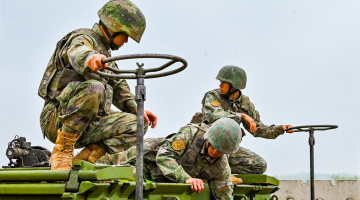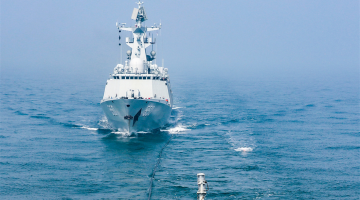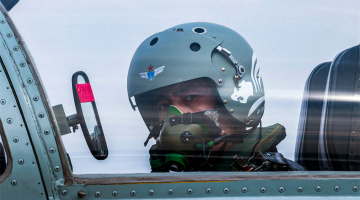By Feng Songjiang
The 2020 National Space Policy recently released by the White House at the one-year anniversary of the establishment of US Space Force outlines America's space development plan and specific measures for its implementation. The document and the recent Schriever Wargame 2020 (SW 20) both exaggerate the so-called "space threat" and try to form a "space NATO" with American allies, fully revealing Washington's ambition to maintain its hegemony by securing supremacy in the outer space.
The US braces for space warfighting targeting China and Russia. The latest SW 20 led by the newly formed US Space Force for the first time claimed to highlight space threats from Russia and China, which reflected America's Cold War mentality and hegemonistic concept.
The US National Security Strategy labels China and Russia as revisionist powers and challengers of the global order dominated by the US and its allies. The US National Defense Strategy also deems the long-term strategic competition with China and Russia as the top priority of US Department of Defense. At present, the National Space Policy continues to uphold the "America first" policy and advocate expanding military presence in space targeting Russia and China.
It can be seen that cementing and enhancing its competitive edges in the space domain has become an important direction of America's strategic adjustment.
The US forms cliques to extend deterrence. Apart from members of the Five Eyes alliance, Germany, France, and Japan also participated in SW 20. What's worth more attention is that for the first time in over 50 years, the US shared highly classified information with its allies directly, breaking the convention that such sharing is only available with special permission. Such a move indicated the Pentagon's concept of strengthening the alliance for high-end wars.
In recent years, the US has shifted its strategic focus to great power competition, especially for the high-end adversaries. The US National Space Strategy proposes to drive US leadership in space through close partnership with the private sector and allies. The newly released National Space Policy mentions allies and their interests multiple times with a noticeable tinge of cajoling.
As space becomes an all-round warfighting domain, our unique advantage is the ability to seamlessly integrate multi-domain capabilities from multiple allies and partners, said Raymond, Chief of Space Operations, US Space Force.
The US attaches great importance to exercises, which leads to American military development. That the SW 20 was held on schedule despite the raging COVID-19 pandemic indicates America's urgent need to cope with a new environment featured by intensified space confrontation, reduced combat efficiency, and restricted military operations, and to reinforce the judgment of threats.
Participants in the exercise made recommendations for gaining and maintaining an operational and strategic advantage through coordinated and integrated strategic messaging, used the Battlefield Information Exploitation and Collection System, and virtually verified the recommendations to support the production of a roadmap on enhancing joint space capabilities.
Moreover, both the "Global Sentinel" exercise aimed at improving the joint space status perception of the US and its allies and the "Space Flag" exercise that explores theories, concepts, and technologies of space combat are also key areas of US military investment. The series of exercises play a vital role in leading space conceptualization, command and control enhancement, capability building, and joint operation fortification of the US military.
It's foreseeable that the US will continue to hype up the so-called space threat. By hosting the SW 20 and other exercises, it will speed up the formation of a "space NATO" and try to dominate the formulation of international space rules in the attempt to pave the way for its "space domination". The international community should be highly alert to that.
(The author is from the Research Center for Space Security at the People's Liberation Army Strategic Support Force (PLASSF) Space Engineering University.)









